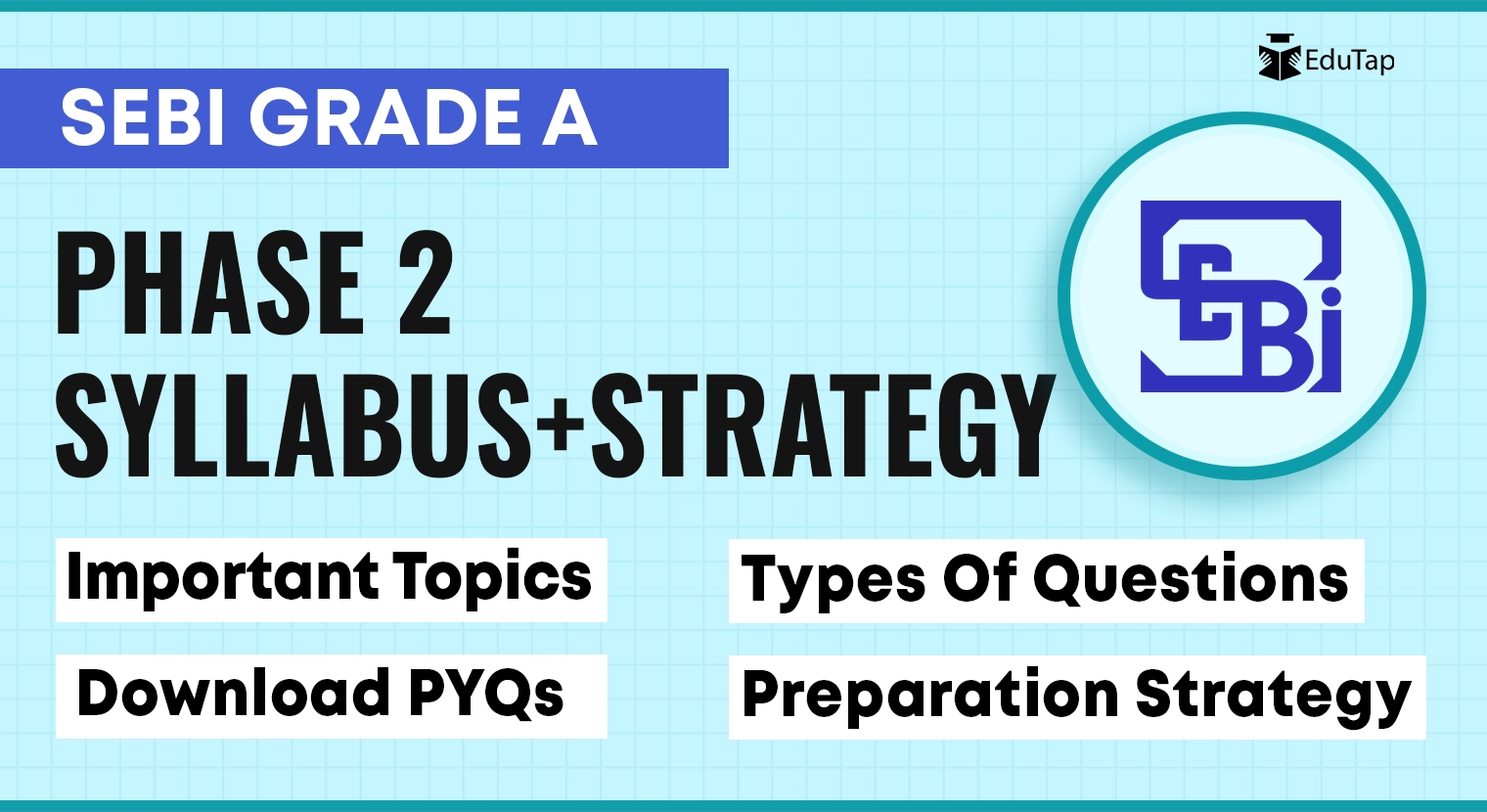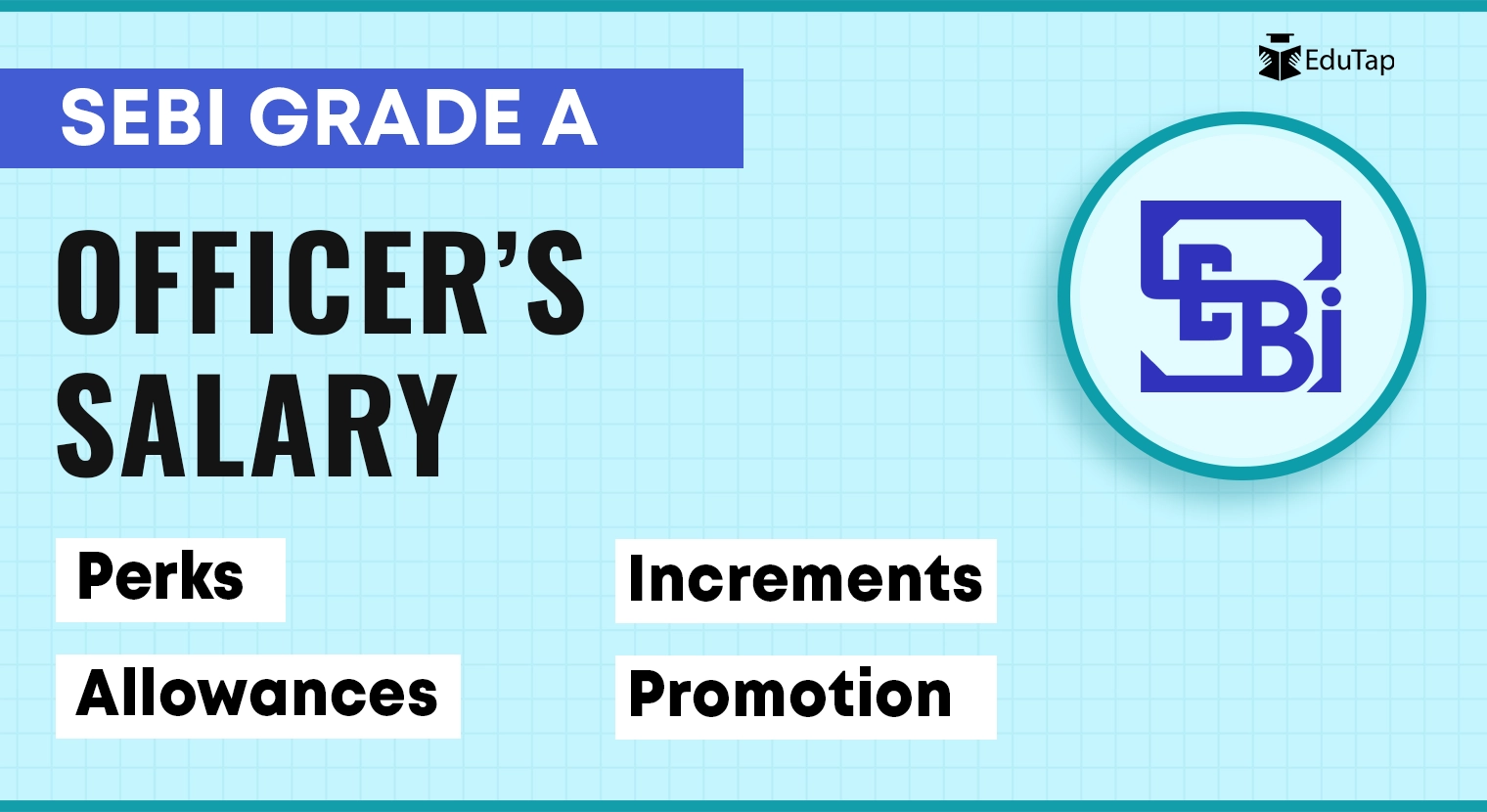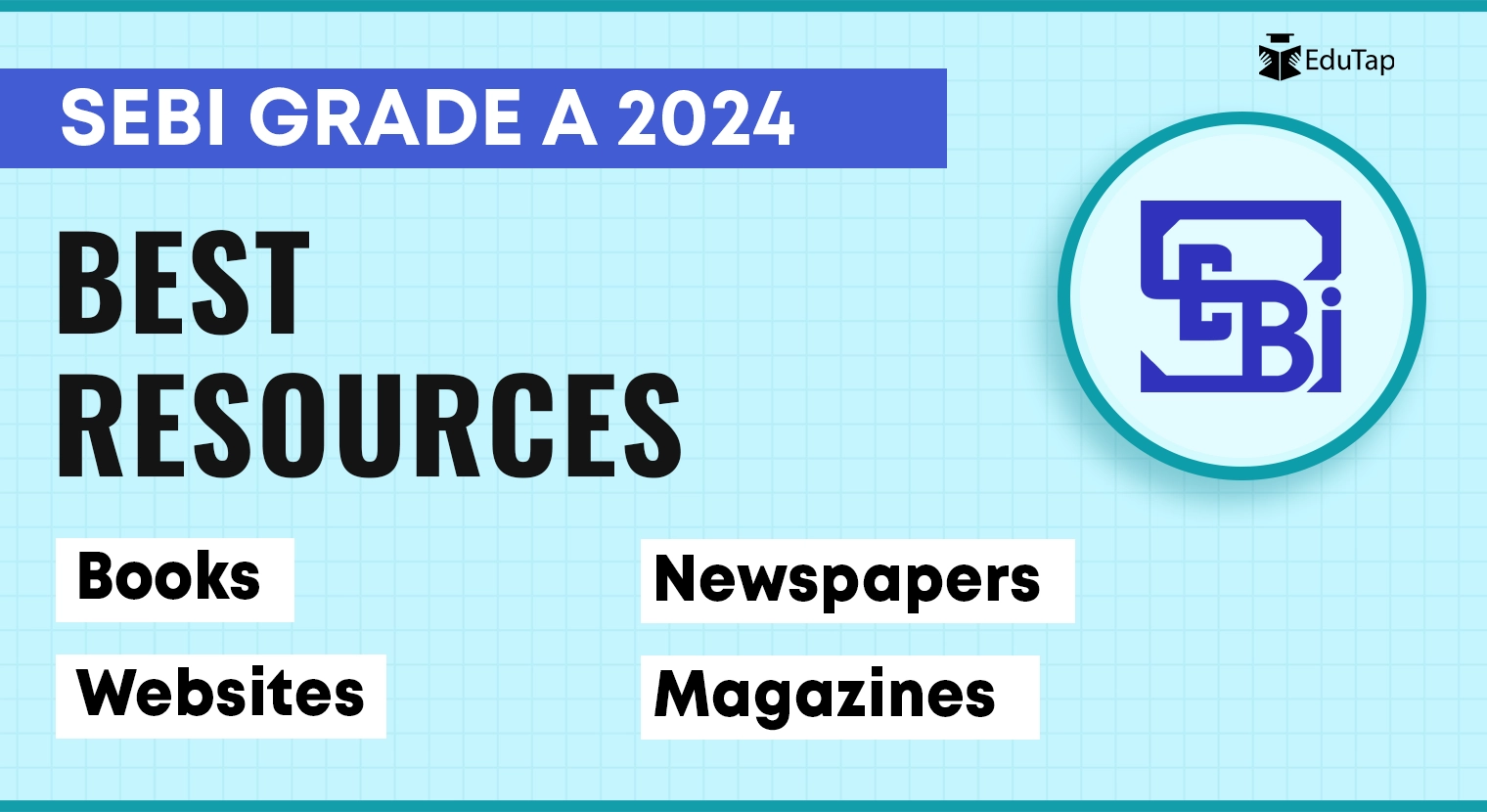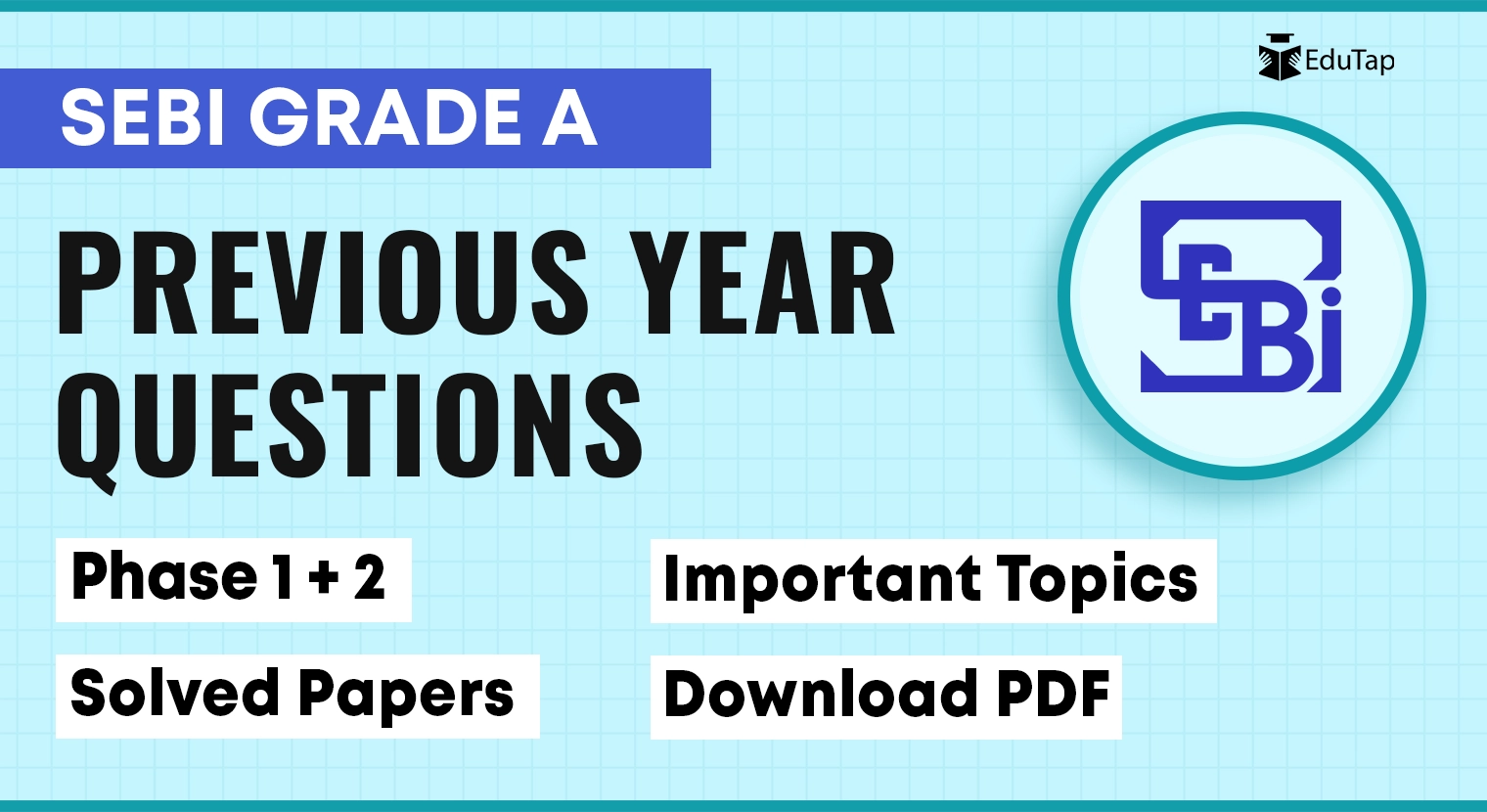The SEBI Grade A Phase 2 exam is the second hurdle in the SEBI Grade A Officer recruitment process. The exam is a comprehensive assessment of candidates’ knowledge and expertise in various subjects, including commerce, accountancy, management, finance, costing, companies act, and economics.
This article outlines the Generalist stream’s exam syllabus, important topics, types of questions, and overall difficulty level. Additionally, it offers effective tips on developing a high-scoring preparation strategy to help candidates achieve their desired results.

SEBI Grade A Phase 2 Complete Syllabus
SEBI Grade A Phase 2 exam is an online examination consisting of two papers of 100 marks each.
- Paper I: English (Descriptive Test)
- Paper II: Multiple choice questions on Commerce, Accountancy, Management, Finance, Costing, Companies Act, and Economics.
Note: The syllabus for paper 2 of Phase 1 and 2 is the same for the SEBI Grade A Officer recruitment. It is given in the SEBI Grade A advertisement. You can download the syllabus PDF for 2022 exam here (Page No. 19-20).
The Phase 2 syllabus listed in this article adds a few topics to the official syllabus to provide a more comprehensive overview. Let’s review the subject-wise SEBI Grade A phase 2 syllabus, important topics, types of questions, and the overall difficulty level.
Descriptive English
The English paper aims to assess how well you can write and how well you understand conceptual topics. It includes,
- Essay Writing
- Precis Writing
- Reading Comprehension
Essay topics cover various subjects, such as economics, finance, technology and the internet, abstract concepts, and social issues. Precis writing passages are taken from newspapers, and reading comprehension questions are based on a paragraph that is provided.
Descriptive English: Types of Questions
Following are questions from the SEBI Grade A 2022 Phase 2 examination.
| Topic: Essay Writing | |
| Q1. | Write an Essay of about 200 words on any one of the following topics. (30 Marks) |
| a) | Mental Health and its impacts that should be spoken about |
| b) | Role of Banks in Financial Literacy |
| c) | Techno-stress and its impacts on students and teachers in the education sector |
| d) | Asset Reconstruction Companies |
| Topic: Precis Writing | |
| Q2. | Read the given passage and draft a precis within 150 words. (30 Marks) |
| Certainly, with the advent of globalisation, the market has become more competitive, because it has opened the opportunity for new competitors. This does not necessarily mean risk for the survival of local businesses, but a challenge that they must consider. This challenge relates to the need to create greater consumer loyalty to products and services, greater suitability of the product to the consumer’s needs, and greater concern about the social impact of the company. Moreover, this global scenario represents some opportunities for the companies to act in the new markets. It is clear that this action will depend mainly on the quality of their products and services offered. However, first, the concept of product quality is not so immediate and obvious. Although not universally accepted, the definition of quality with greater consensus is “suitability for consumer usage.” This definition is comprehensive because it includes two aspects: characteristics that lead to satisfaction with the product and the absence of failures. In fact, the main component consists of the quality characteristics of the product features that meet the consumers’ needs and thus it provides satisfaction for the same. These needs are related not only to the intrinsic characteristics of the product, such as the sensory characteristics of a food product but also to its availability in the market with a compatible price and in suitable packaging. The other part is the absence of faults, which is related to the characteristics of the product according to their specifications, making the consumer inspired by the reliability of the product, i.e., the consumer is sure that he will acquire a safe product, without health risks, and with the properties claimed on the label.For these objectives to be achieved it requires efficient management of quality, which implies continuous improvement activities at each operational level and in every functional area of the organisation. Quality management combines commitment, discipline, and a growing effort by everyone involved in the production process and fundamental techniques of management and administration, with the goal of continuously improving all processes. For that, the industries need to be structured organizationally, establish policies and quality programs, measure customers’ satisfaction, and even use more quality tools and methodologies. Specifically for the food industry, it also involves the knowledge and application of techniques and programs for product safety. | |
| Topic: Reading Comprehension | |
| Q3. | Read the given passage and answer the given questions.(40 Marks) |
| Role of Weather Forecasting in the Agriculture Sector. Agriculture and farming are mainly dependent on seasons and weather. The temperature matters a lot in that case when it comes to the farming of different kinds of fruits, vegetables, and pulses. Previously we did not have a better understanding of weather forecasting and farmers were still doing their job based on predictions. Though sometimes they occur loss due to false predictions of weather. Now that the technology is developed and special weather forecasting mechanisms are available, the farmers can get all the updates on a smartphone. Education towards that is, of course, an important thing but most of the farmer population at this stage knows the basics which makes it easy for them to use the features. Occurrences of erratic weather are beyond human control. It is possible, however, to adapt to or mitigate the effects of adverse weather if a forecast of the expected weather can be obtained in time. Forecasts should ideally be used for small areas. Some aspects of weather forecasts for agriculture are quite distinct from synoptic weather forecasts. While clear weather is required for sowing operations, it must be preceded by seed zone soil moisture storage. Crop weather factors mean that crops and cropping practices vary across areas within the same season. In the case of well-organised weather systems, the desired aerial delineation of forecasts can be realised. The area to which the weather forecasts will be applied must be unambiguously stated. Weather forecasting is a prediction of conditions of the atmosphere depending on location and time. Every area will have different predictions related to the condition of weather which makes it pretty easy for the farmers to know how and what to do when. The relationship between weather and agriculture has, therefore, necessitated the need for accurate prediction of the weather; to enable farmers to make an informed decision that will not bring losses to them. Temperature, sunlight, and rainfall have major effects on the crops. For livestock, temperatures and adequate water and food are essential. The forecast of the weather event helps for suitable planning of farming operations. It helps to decide whether to undertake or withhold the sowing operation. To irrigate the crop or not, when to apply fertiliser and whether to start complete harvesting or to withhold it are the major components for which forecasting is a must. Irrigation is an artificial application of water to land for agricultural production and farming. The requirements for irrigation and crop growth are affected by weather variability. The amount of timing and evapotranspiration are two main weather-related requirements. Climate variability is something that all farmers need to react to. Extended periods of dry conditions, commonly known as drought are one of the major impacts on the irrigation system. So if their proper forecast is done chances of losses are way lower than expected. Drought can increase daily crop water use due to lower humidity and accompanied by higher temperatures. Managing under extreme conditions, irrigators need to understand daily and seasonal crop water use patterns, as well as adopt practices and technology that result in good production of crops. Timing of fertiliser has a significant effect on crop yields. Proper timing of the fertiliser application increases yields, reduces nutrient losses, and prevents damage to the environment. Wrong timing and not predicting the weather may result in a waste of fertiliser and even damage the crop. Knowledge of how the application of the fertiliser is done is required. Weather forecasts can help the farmers to decide the timing on when to apply them and in which condition. Both the resources and money could be wasted if the application of fertiliser is done wrong and hence proper knowledge and prediction is a must. According to research, fertilising plants in winter is not good as the crops do not actively grow. Actual temperatures may shift above and below averages from year to year. The consequences of unseasonal changes in temperature and their potential negative effects on host plants and pests are very well known. Unseasonably high temperatures may lead to lower plant productivity and more pests on the farm. Applying pest and disease control is important to protect the farm and crops from insects. Weather forecasts help farmers to know when to apply the pests and chemicals to avoid crop wastage. By some estimates, up to 40 percent of the world’s food supply is already lost due to pests. Reduction in pests and applied chemicals is important to ensure global food security, reduced application of inputs, and decreased greenhouse emissions. Climate-smart pest management is a cross-sectoral approach that aims to highly reduce pest-induced crop losses. And the method along with the forecast should be applied everywhere to ignore the wastage. The method of getting experts to do tailor-made weather forecasts is a little bit expensive compared with the use of the cheap weather forecast information available in the media but it is beneficial to the farmers in the long run. In the future, therefore, farmers will come to rely on satellite forecasting due to numerous advantages. | |
| a) | Discuss the correlation between Agriculture and Weather forecasting. |
| b) | How does Weather forecasting help the farmers? |
| c) | How important is weather forecasting with respect to Irrigation? |
| d) | Discuss the role of fertilisers in a crop cycle. |
| e) | Discuss the impact of seasonal changes of temperature on the crops. |
Key Takeaways:
- Read widely and extensively. This will give you a broad base of topics and exam-relevant vocabulary to draw from when writing your essay. The more you read, the better prepared you will be to write on any given topic.
- Practise typing regularly. The more you type, the better you will become at expressing your thoughts and ideas clearly and concisely. You will also be able to simultaneously develop typing speed and accuracy.
Download the solved PYQs for SEBI Grade A 2022 Phase 2 exam.
Commerce and Accountancy Syllabus
Following is the list of topics you must prepare for Commerce and Accountancy.
- Accounting as a financial information system.
- Accounting Standards with specific reference to Accounting for Depreciation, Inventories, Revenue Recognition, Fixed Assets, Foreign Exchange Transactions, and Investments.
- Cash Flow Statement, Fund flow statement, Financial statement analysis; Ratio analysis.
- Accounting for Share Capital Transactions including Bonus Shares and Right Shares.
- Employees Stock Option and BuyBack of Securities.
- Preparation and Presentation of Company Final Accounts.
- Introduction to Accountancy
- Theory Base of Accounting
- Recording Transaction Part 1
- Recording Transaction Part 2
- Trial Balance and Bills of Exchange
Commerce & Accountancy: Types of Questions
Following are a few questions from the SEBI Grade A 2022 Phase 2 examination.
| Topic: Ratio Analysis | |
| Q1. | Using the information given below, calculate the Interest Coverage Ratio. Net Profit after Tax: Rs. 60,000 Tax Rate: 40%15% Long Term Debt: Rs. 10,00,000 |
| a) | 1.35 |
| b) | 1.5 |
| c) | 1.67 |
| d) | 1.98 |
| e) | 1 |
| Topic: Preparation of Final Company Accounts | |
| Q2. | Calculate the Gross profit Ratio from the given information. Particulars Amount Sales Rs 1,00,000 Purchase Rs 75,000 Carriage Inward Rs 2000 Wages Rs 5000 Salary Rs 15,000 Decrease in Inventory Rs 10,000 Purchase Return Rs 2000 |
| a) | 5% |
| b) | 10% |
| c) | 15% |
| d) | 20% |
| e) | None of the above |
| Topic: Accounting Standard of Inventories | |
| Q3. | A company purchased an inventory of 1000 units@1200 per unit from outside vendors. The vendor allowed a trade discount of 5%. Vendors offered a cash discount of 3% if payment is made in 45 days. The company decided to avail that. Custom duty is 50 per unit and delivery charges are 6000 as a whole. Find the value of inventory as per AS 2. |
| a) | 12,00,000 |
| b) | 11,96,000 |
| c) | 10,90,000 |
| d) | 12,25,000 |
| e) | None of the above |
Key Takeaways
- Ratio Analysis was given heavy weightage in the 2022 exam, with numerous questions being asked from this single topic. However, that will not be the case every year.
- Numerical problem-solving is crucial for success in the Commerce and Accounts section. While the majority of numerical questions are marked as moderately difficult, consistent practice will make them easier to tackle.
Download the solved PYQs for SEBI Grade A 2022 Phase 2 exam.
Management Syllabus
Following is the list of topics you must prepare for Management.
- Management: Its nature and scope; The Management Processes. Planning, Organization, Staffing, Directing, and Controlling.
- The Role of a Manager in an Organization. Leadership: The Tasks of a Leader.
- Leadership Styles: Leadership Theories; A successful Leader versus an effective Leader.
- Human Resource Development: Concept of HRD; Goals of HRD
- Motivation, Morale, and Incentives: Theories of Motivation; How Managers Motivate; Concept of Morale; Factors determining Morale; Role of Incentives in Building up Morale.
- Communication: Steps in the Communication Process; Communication Channels; Oral versus Written Communication; Verbal versus non-verbal Communication; upward, downward and lateral communication; Barriers to Communication, Role of Information Technology.
Management: Types of Questions
Following are a few questions from the SEBI Grade A 2022 Phase 2 examination.
| Topic: Communication | |
| Q1. | Events like Anger, frustration, humour, etc, can blur the decision-making capacities of a person and thus limit the effectiveness of their communication. These events act as which of the following types of barriers to effective communication? |
| a) | Psychological Barriers |
| b) | Emotional Barriers |
| c) | Physical Barriers |
| d) | Perception Barriers |
| e) | None of the above |
| Topic: Motivation | |
| Q2. | Which of the following is true for organisational Morale but not for motivation? |
| a) | Morale deals with the work environment and is the primary factor driving the organisation |
| b) | Morale acquires a primary concern in every organisation |
| c) | Morale is an internal psychological drive of an individual that urges him to behave in a specific manner |
| d) | High Morale leads to high motivation among employees |
| e) | None of the above |
| Topic: HRD | |
| Q3. | Identify the HRD Subsystem where employee performance is increased with an increase in his ability and Knowledge. |
| a) | Training and Development |
| b) | Career Planning |
| c) | Performance Appraisal |
| d) | Organisational Development |
| e) | None of the above |
Key Takeaways
- The paper witnessed a comprehensive syllabus coverage with no single topic from the syllabus being given high priority in the exam.
- A strong grasp of management concepts will enable candidates to easily tackle even moderate-level questions.
Download the solved PYQs for SEBI Grade A 2022 Phase 2 exam.
Finance Syllabus
Following is the list of topics you must prepare for Finance.
- Financial System: Role and Functions of Regulatory Bodies in the Financial Sector.
- Financial Markets: Primary and Secondary Markets (Forex, Money, Bond, Equity, etc.), functions, instruments, and recent developments.
- Basics of Derivatives: Forward, Futures, and Swap
- Recent Developments in the Financial Sector
- Financial Inclusion- use of technology
- Alternate source of finance, private and social cost-benefit, Public-Private Partnership
- Direct and Indirect taxes;-Non-tax sources of Revenue, GST, Finance Commission, Fiscal Policy, Fiscal Responsibility and Budget Management Act(FRBM),
- Inflation:-Definition, trends, estimates, consequences, and remedies (control): WPI, CPI-components, and trends
Finance: Types of Questions
Following are a few questions from the SEBI Grade A 2022 Phase 2 examination.
| Topic: Functions of RBI | |
| Q1. | Which of the following is not a method of quantitative control by RBI? |
| a) | CRR |
| b) | SLR |
| c) | Marginal Standing Facility |
| d) | Repo and Reverse Repo |
| e) | Credit Rationing |
| Topic: Finance Current Affairs | |
| Q2. | Recently SEBI has launched the mobile app _________ with a view to empower investors with knowledge about the securities market. |
| a) | Saarthi |
| b) | UMANG |
| c) | PARTH |
| d) | Aayakar Setu |
| e) | None of the above |
| Topic: Forex Market | |
| Q3. | Which of the following statements regarding the interest rate parity is true? |
| a) | The same goods must sell for the same price across countries. |
| b) | Interest rates across countries will eventually be the same. |
| c) | There is an offsetting relationship between interest rate differentials and differentials in the forwards & spot exchange market. |
| d) | There is an offsetting relationship between costs and revenues in similar market environments. |
| e) | None of the above. |
Key Takeaways
- Aspirants are advised to focus on core Finance concepts and their application; current affairs hold less weightage in Phase 2.
- Practice Derivatives and Bonds, as numerical questions are mostly limited to these topics only.
Download the solved PYQs for SEBI Grade A 2022 Phase 2 exam.
Costing Syllabus
Following is the list of topics you must prepare for Costing.
- Overview of Cost and Management Accounting: Introduction to Cost and Management Accounting, Objectives and Scope of Cost and Management Accounting.
- Methods of Costing: Single Output/ Unit Costing, Job Costing, Batch Costing, Contract Costing, Process/ Operation Costing, and Costing of Service Sectors.
- Basics of Cost Control and Analysis- (a) Standard Costing, (b) Marginal Costing, (c) Budget, and Budgetary Control.
- Lean System and Innovation – Introduction to Lean System, Just-in-Time (JIT), Kaizen Costing, 5 Ss, Total Productive Maintenance (TPM), Cellular Manufacturing/ One-Piece Flow Production Systems, Six Sigma (SS), Introduction to Process Innovation and Business Process Re-engineering(BPR)
Costing: Types of Questions
Following are a few questions from the SEBI Grade A 2022 Phase 2 examination.
| Topic: Budget and Budgetary Control | |
| Q1. | Which of the following is a modern management accounting technique? |
| a) | Human Resource Accounting |
| b) | Statical Reports |
| c) | Responsibility Accounting |
| d) | Break Even Analysis |
| e) | None of the above |
| Topic: Overview of Cost and Management Accounting | |
| Q2. | Calculate the Prime Cost using the information given below: Direct Material Cost– Rs 1,00,000 Direct Labour Cost– Rs 68,000 Fixed Overheads – Rs 1,50,000 Variable Overheads – Rs 24,000 |
| a) | Rs 1,58,000 |
| b) | Rs 1,68,000 |
| c) | Rs 1,78,000 |
| d) | Rs 1,88,000 |
| e) | Rs 1,98,000 |
| Topic: Marginal Costing | |
| Q3. | Calculate the break-even point (BEP) from the following information. Sale – ₹30 per unit Trade Discount – 10% Direct Material – ₹12 per unit Direct Labour – ₹6 per unit Variable Expenses – 50% of Direct Labour Fixed Cost – ₹60,000 |
| a) | 1000 |
| b) | 10,000 |
| c) | 1,00,000 |
| d) | 6000 |
| e) | None of the above |
Key Takeaways
- The 2022 exam presented questions on topics of Material Cost and Overhead Cost, which are not mentioned directly in the syllabus. However, they are basic concepts of Costing. Aspirants are advised to build a strong foundational knowledge of the syllabus.
- Regular practice of numerical problems will enhance the ease of attempting the Costing section.
Download the solved PYQs for SEBI Grade A 2022 Phase 2 exam.
Companies Act Syllabus
Following is the list of topics you must prepare for the Companies Act.
- The Companies Act, 2013- Specific reference to Chapter III, Chapter IV, Chapter VIII, Chapter X, Chapter XI, Chapter XII, and Chapter XXVII.
- Chapter IX Companies Act: Accounts of Company
- Chapter XIII Companies Act: Remuneration of Managerial Personnel
- Chapter I of Companies Act: Basics of Companies Act
Companies Act: Types of Questions
Following are a few questions from the SEBI Grade A 2022 Phase 2 examination.
| Topic: Chapter XXVII NCLT and NCLAT | |
| Q1. | The president of NCLT, chairperson of NCLAT, and Judicial members are appointed by the government in consultation with ________. |
| a) | President of India |
| b) | Law Minister |
| c) | Minister of Corporate Affairs |
| d) | Chief Justice of India |
| e) | SEBI Chairman |
| Topic: Chapter XI Appointment of Directors (sections 149 to 160) | |
| Q2. | The tenure of independent directors is for ________consecutive years and if he is to be appointed for a second term, a special resolution needs to be passed. |
| a) | 5 |
| b) | 3 |
| c) | 10 |
| d) | 6 |
| e) | None of the above |
| Topic: Chapter VIII Declaration and Payment of Dividend | |
| Q3. | Under Section 124 of the Companies Act, if the money is not paid to the shareholders and lying idle for ____ years, it is transferred to investor education and protection funds. |
| a) | 5 |
| b) | 7 |
| c) | 10 |
| d) | 15 |
| e) | 12 |
Key Takeaways
- Questions under the Companies Act are generally evenly distributed across all given chapters in the syllabus.
- The asked questions focus on factual data of the Companies Act. Candidates are advised to thoroughly study and retain the listed chapters in the given syllabus.
Download the solved PYQs for SEBI Grade A 2022 Phase 2 exam.
Economics Syllabus
Following is the list of topics you must prepare for Economics.
- Demand and Supply, Market Structures, National Income: Concepts and Measurement, Classical Vs Keynesian Approach Determination of output and employment, Consumption Function, Investment Function, Multiplier, and Accelerator, Demand and Supply for Money, IS-LM, Inflation and Phillips Curve, Business Cycles
- Balance of Payments, Foreign Exchange Markets, Inflation, Monetary and Fiscal Policy, Non-banking Financial Institutions.
Economics: Types of Questions
Following are a few questions from the SEBI Grade A 2022 Phase 2 examination.
| Topic: Non-Banking Financial Institutions | |
| Q1. | Identify the Incorrect statement regarding NBFC. |
| a) | NBFCs do not form part of the payment and settlement system |
| b) | NBFC cannot issue cheques drawn on itself |
| c) | The deposit insurance facility of Deposit Insurance and Credit Guarantee Corporation is not available to depositors of NBFCs |
| d) | NBFC is a company registered under the Companies Act, 1956 engaged in the business of loans and advances, acquisition of shares/stocks/bonds/debentures/securities issued by the Government |
| e) | NBFC can accept demand deposits |
| Topic: Fiscal Policy | |
| Q2. | Non-plan expenditure constitutes the biggest proportion of the government’s total expenditure. Which of the following is not a non-planned expenditure? |
| a) | Defense Expenditure |
| b) | Debt Servicing |
| c) | Expenditure on Electricity generation |
| d) | Interest Payments |
| e) | Subsidies |
| Topic: Money Supply | |
| Q3. | Which of the following defines the monetary base? |
| a) | The sum of currency in circulation and Bankers’ deposits with the RBI. |
| b) | The sum of currency in circulation and the currency held by commercial banks. |
| c) | The sum of gold and foreign exchange held by the central bank |
| d) | The sum of real assets of the banking sector plus its net worth |
| e) | None of the above |
Key Takeaways
- The economics section requires both factual and practical knowledge. A clear understanding of basic concepts is essential for scoring high marks.
- In the economics section of 2022, questions were distributed across all topics. Aspirants are advised to cover the given syllabus comprehensively.
Download the solved PYQs for SEBI Grade A 2022 Phase 2 exam.
Important Note: The 2024 Phase 2 syllabus, exam pattern, and question format are subject to change at the discretion of SEBI as per the detailed recruitment notification to be released on 13 April 2024.
SEBI Grade A 2024 Phase 2: Difficulty Level
Understanding the SEBI Grade A Phase 2 exam’s difficulty level is crucial for strategic preparation and maximising your chances of success.
For example, by knowing the difficulty level of each section, you can choose study resources that align with your needs, ensuring targeted preparation.
Paper 1 Difficulty Level
For descriptive English, the difficulty level is generally moderate. Following are 3 quick tips to help you better your preparation.
- Grasp the exam pattern and understand the types of questions asked for essay, precis, and comprehension respectively.
- Incorporate regular editorial reading into your routine and practice summarising read content in your own words.
- Practice typing editorials in Notepad, follow time limits, and incorporate Grammarly for grammatical checks.
Paper 2 Difficulty Level
Following is the overall breakdown of the difficulty level for the SEBI Grade A Phase 2 Paper 2.
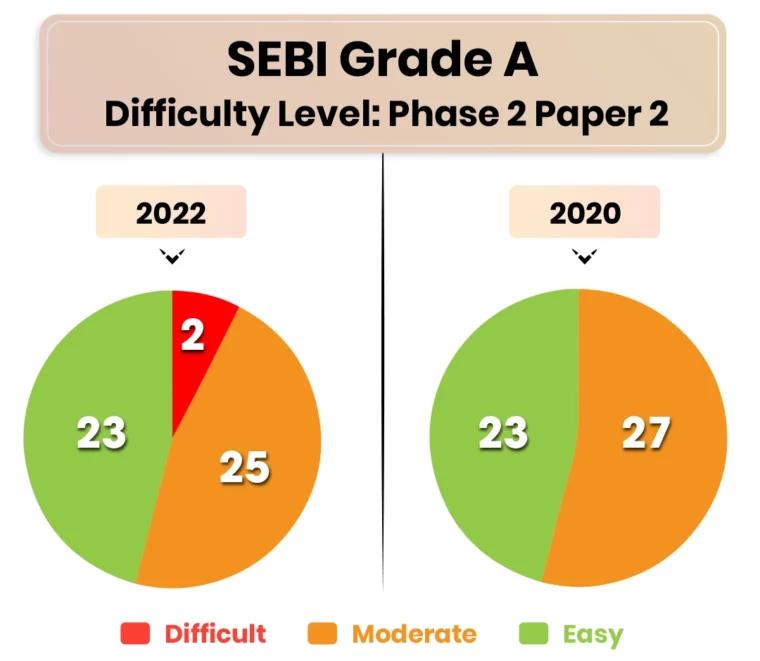
To ace the SEBI Grade A Phase 2 exam, aspirants need to prioritise answer accuracy and thoroughly cover syllabus topics, including basic concepts. Analysing previous year’s questions, attempting mock tests, and practising numerical problems can help prepare better for the difficulty level.
Remember, application-based questions are asked across sections, so study both theoretical concepts and their practical applications.
SEBI Grade A 2024 Phase 2: Most Important Topics
Accurately identifying important SEBI Grade A exam topics for Phase 2 requires analysing the previous year’s question papers for five years minimum. However, major syllabus changes in 2020 make it challenging to rely solely on papers for two years (2020 and 2022) to list the most frequently asked topics.
Aspirants are strongly advised to thoroughly prepare the above-listed syllabus to ensure a well-rounded preparation.
Click Here for a comprehensive analysis of the previous year’s questions (2020 & 2022) of phase 1 and 2.

SEBI Grade A 2024 Phase 2: Preparation Strategy
When developing an effective preparation strategy for Phase 2 of the SEBI Grade A exam, the most important question is where to start. Here are a few points you need to remember when developing your preparation strategy for the SEBI Grade A Phase 2 exam.
- Even though the Paper 2 syllabus is the same, the types of questions asked in Phase 2 are different from Phase 1.
- Phase 2 will have numerical questions from subjects like Commerce, Accountancy, and Costing.
- The SEBI Grade A exam questions are application-based, requiring you to apply concepts learned in subjects like Economics and Accounts.
- For subjects like Companies Act and Management, focus on consistently revising the factual information.
Now that you are clear with the base of your strategy, let’s look at the two key focus areas that will help you score high marks in Phase 2.
Descriptive English
- Learn the technicalities of writing an essay, precis, and comprehension.
- Read editorials from any one financial and non-financial newspaper.
- Practice typing the editorials in your own words in Notepad (application).
- Follow a time limit to enhance speed.
- Essay: 20-25 minutes for 250-300 words
- Precis: 20 minutes for about 170 words
- Remember to use Grammarly for grammatical checks.
Numerical Questions
- Finance: Derivative and Bonds
- Costing: Process Costing, Marginal Costing, Standard Costing, Budget
- Commerce & Accounts: Ratios, Cash Flow, Accounting Standards/Accounting
SEBI Grade A phase 2 preparation is essential for achieving a high score and securing a place in the SEBI Grade A interview process. How to prepare for SEBI Grade A phase 2 effectively involves utilising the best sources, such as high-quality study materials, practice questions, and mock tests.
Disclaimer: The provided video outlines a comprehensive preparation strategy for the SEBI Grade A 2022 Phase 2 exam. While the video targets the 2022 exam, the preparation strategy remains applicable for the 2024 recruitment as well. The fundamentals of the exam have remained the same for the last two exam years.
Conclusion
The SEBI Grade A Phase 2 exam demands a thorough understanding of the syllabus and the ability to apply theoretical concepts to practical scenarios. By following the preparation strategies outlined in this article and understanding the types of theoretical and numerical questions asked, candidates can increase their chances of success.
Remember, accuracy, conceptual application, and consistent revision are key to achieving a high score in the SEBI Grade A 2024 examination.
FAQs
A dedicated study plan of 4-6 months is recommended to thoroughly cover the SEBI Grade A Phase 2 syllabus and adequately prepare for the exam. This time frame allows you to grasp key concepts, practice problem-solving, and refine your exam-taking strategies.
Yes, each section of the exam requires tailored preparation strategies. For instance, the descriptive English paper demands strong vocabulary, grammar, and comprehension skills, while Paper 2 focuses on subject-specific expertise, numerical question-solving abilities, and conceptual application of the syllabus.
The start date for SEBI Grade A registration is 13 April 2024.
Yes, the syllabus for the Paper 2 of SEBI Grade A Phase 2 exam is the same as the Phase 1 syllabus. However, the types of questions asked are different. Phase 2 exam presents more application-based questions as well as numerical questions.
